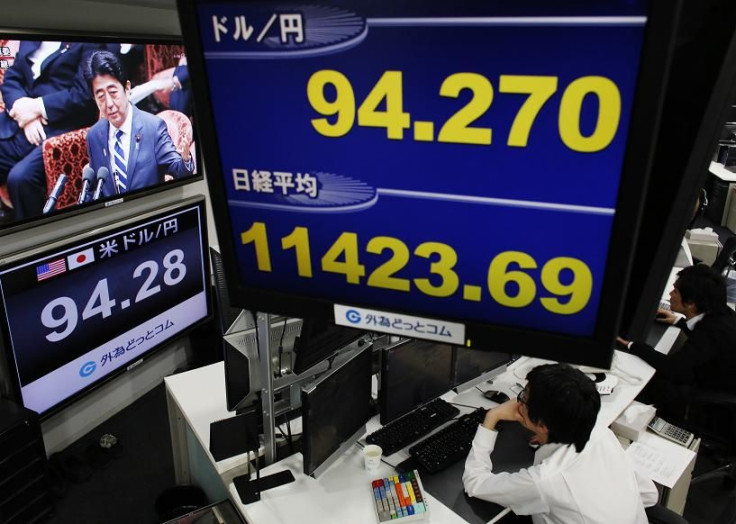Why Japan's Yen Is Sinking And Its Stock Market Is Soaring, So Far It's Not A 'Currency War'
Analysis

The insistence by Japan’s new government that the central bank print more money and the tacit approval of such a policy by the leaders of wealthy nations sent the yen sinking and the Japanese stock market soaring on Monday.
The Nikkei 225 stock index jumped to 11,407.87, a gain of 234.04 points, or 2.09 percent. The yen, which already has tumbled 20 percent against the dollar since the middle of November, fell again: By the end of Monday trading it took 93.98 yen to buy one dollar, which is close to its 33-month low.
Analysts pointed to two factors driving down the yen. One is newly elected Japanese Prime Minister Shinzo Abe threatening the Bank of Japan that if it did not hit its 2 percent inflation target, which it set in January, it would become necessary to change the laws under which the BoJ operates.
Japan’s export-oriented economy has been in a deflationary cycle for years, and Abe, who became prime minister on Dec. 26, 2012, wants the BoJ to print more money, also known as “monetary easing,” to cheapen the currency and lower interest rates. A cheaper yen will make Japanese goods, such as electronic products and cars, less expensive in overseas markets and thus more competitive; it also will lower interest rates, thus stimulating domestic consumption and bank lending to businesses.
There is a widespread perception that the central bank will go along with Abe’s mandate. That has motivated many currency traders to bet on the currency's decline. For example since November, George Soros has booked $970 million in profit from "shorting" the yen.
“There’s a high chance the BoJ will apply more monetary easing,” in coming months, Kyohei Morita, chief economist at Barclays PLC in Tokyo, told Bloomberg News. Morita also said he expects the BoJ to begin taking such action in April or May after it gets a new governor.
Stock traders, meanwhile, have been bidding up Japanese stocks on the hunch that monetary easing will indeed stimulate business activity and domestic consumption.
A second reason for the yen’s plunge and the Nikkei’s rise is the decision by leaders of the G-20 group of rich nations, which met in Moscow over the weekend, to accept a cheaper yen. The move raised eyebrows because often times when one nation cheapens its currency with money printing, its trading partners follow suit to keep their own exports competitively priced. Such a syndrome, if left unchecked, is sometimes referred to as a “currency war.” The phrase recalls a full-blown global currency war in the 1930s that devastated international trade and, thus, economic well-being.
When those G-20 leaders, including those from Japan, said over the weekend that they would not respond to a cheaper yen by lowering their own currencies they did so with the full knowledge that it could weaken their own nations’ exports.
One reason that the G-20 may have taken a wait-and-see posture to Japan’s monetary easing is because it is seen as fairly modest in scope and also because of the G-20's long-standing policy of refusing – at least collectively – to engage in competitive devaluations.
“For the record, our view is that the Moscow communiqué used tougher language than that issued after the previous G-20 meeting in Mexico City last November, but there was nothing new of substance,” Julian Jessorp, chief global economist for Capital Economics, said Monday.
“In particular, the Moscow statement said both that ‘We will refrain from competitive devaluation’ and that ‘We will not target our exchange rates for competitive purposes.’ However, this is simply doubling up on the Mexico commitment to “refrain from competitive devaluation of currencies.”
Monday’s gain in the Nikkei extends a three-month rally in the country’s equity market. Since mid-November, when Abe began campaigning, the stock index has climbed 30 percent
© Copyright IBTimes 2024. All rights reserved.






















